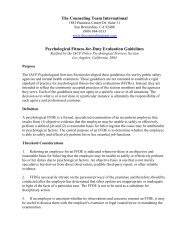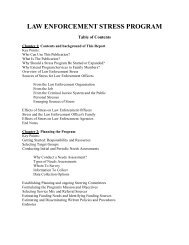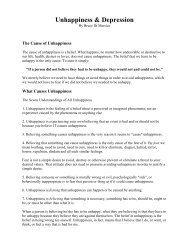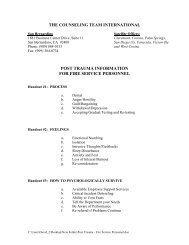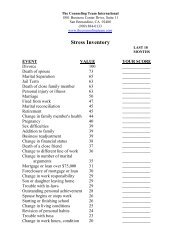Excessive stress can result in at least four serious problems for officers:Stress may result in physical illnesses, ranging from heart disease to eating disorders. Itmay also precipitate substance abuse among susceptible individuals.[18]Stress can lead to burnout among officers.[19]Stress has been implicated in excessive disability retirements.[20] Even when physicalailments are the reason for the disability, the illnesses may have been brought on bystress.Correctional officers experiencing excessive stress may damage their family relationshipsby displacing their frustration onto spouses and children, ordering family membersaround just as they issue commands to inmates (one officer locked his son out of theboy's room and searched it), and becoming distant by withholding information about theirwork that they feel family members will not understand. Shift work and overtime cancreate stress by preventing officers from attending important family functions.As discussed above, the effects of stress on correctional officers can degrade their ability toperform their responsibilities in the prison or jail in ways that compromise institutional safety,cost money, and create stress for other staff. <strong>The</strong> remainder of this report addresses theapproaches seven stress programs have implemented to prevent and treat officer stress with thegoals of enhancing the officers' lives and improving the operations of the correctional facilities inwhich they work.Notes1. Huckabee, R.G., "Stress in Corrections: An Overview of the Issues," Journal of CriminalJustice 20 (5) (1992): 479-486.2. Stephan, J.J., Census of State and Federal Correctional Facilities, 1995, Washington, D.C.:U.S. Department of Justice, Bureau of Justice Statistics, 1997, NCJ 166582.3. Ibid.4. Data provided by the American Correctional Association, June 29, 1999.5. Camp, C.G., and G.M. Camp, <strong>The</strong> Corrections Yearbook, 1997, South Salem, New York:Criminal Justice Institute, 1997.
6. Martinez, A.R., "Corrections Officer: <strong>The</strong> 'Other' Prisoner," <strong>The</strong> Keeper's Voice 18 (1)(1997): 8-11.7. Ibid. A few correctional officers suggested that correctional work has not become morestressful. Rather, they said, officers themselves have changed. According to these officers, in thepast many officers came to the job from the military and therefore had a discipline and toughnessthat enabled them to adapt better to the work requirements (see also Kauffman, K., PrisonOfficers and <strong>The</strong>ir World, Cambridge, Massachusetts: Harvard University Press, 1988). Inaddition, life in general may be more stressful. If so, officers may be less able to cope withcorrectional work because they come to work already stressed out. In this connection, someproviders observe that relationship problems are what drive many officers to seek professionalcounseling, not correctional work per se.8. Brodsky, C.M., "Work Stress in Correctional Institutions," Journal of Prison & Jail Health 2(2) (1982): 74-102.9. For example, Grossi, E.L., T.J. Keil, and G.F. Vito, "Surviving 'the Joint': Mitigating Factorsof Correctional Officer Stress," Journal of Crime and Justice 19 (2) (1996): 103-120;Woodruff, L., "Occupational Stress for Correctional Personnel: Part One," American Jails 7 (4)(1993a): 15-20; Philliber, S., "Thy Brother's Keeper: A Review of the Literature on CorrectionalOfficers," Justice Quarterly 4 (1) (1987): 9-35; Lindquist, C.A., and J.T. Whitehead, "Burnout,Job Stress and Job Satisfaction among Southern Correctional Officers-Perceptions and CausalFactors," Journal of Offender <strong>Counseling</strong>, Services and Rehabilitation 10 (4) (1986): 5-26; andCrouch, B.M., "Prison Guards on the Line," in Dilemmas of Punishment, ed. K.C. Hass and G.P.Alpert, Prospect Heights, Illinois: Waveland Press, 1986.10. Woodruff, L., "Occupational Stress for Correctional Personnel"; Gerstein, L.H., C.G. Topp,and C. Correll, "Role of the Environment and Person When Predicting Burnout AmongCorrectional Personnel," Criminal Justice and Behavior 14 (3) (1987): 352-369; and Cullen,F.T., B.G. Link, N.T. Wolfe, and J. Frank, "<strong>The</strong> Social Dimension of Correctional OfficerStress," Justice Quarterly 2 (4) (1985): 505-533.11. Cullen et al., 1985.12. Freeman, R.M., "Remembering the Camp Hill Riot," Corrections Today 59 (1) (1997): 56,58-59.
- Page 1 and 2: ISSUES AND PRACTICESAuthor: Peter F
- Page 3 and 4: The various program options present
- Page 5 and 6: Program overviewCollaboration with
- Page 7 and 8: An unproven interventionPotential b
- Page 9 and 10: Executive SummaryAddressing Correct
- Page 11 and 12: One officer said, "The public hasn'
- Page 13 and 14: Correctional officer union official
- Page 15 and 16: Doing the job carefully in records
- Page 17 and 18: 2. "Commissioner Locks Down Prison
- Page 19 and 20: Chapter 2The Extent and Sources of
- Page 21 and 22: In many prisons and jails, there ar
- Page 23: promising not to create trouble or
- Page 27 and 28: How to Cope with Job Burnout, New Y
- Page 29 and 30: e. Kamerman, J., "Corrections Offic
- Page 31 and 32: Family Service Society serves only
- Page 33 and 34: Society also provides inservice tra
- Page 35 and 36: Family Service Society refers emplo
- Page 37 and 38: Staff more likely to be viewed by o
- Page 39 and 40: Unit team responsibilitiesTypically
- Page 41 and 42: officers were involved. We took tur
- Page 43 and 44: In 1998, the New York State Departm
- Page 45 and 46: An officer and a lieutenant, both o
- Page 47 and 48: Bruce W. BakerAssistant Commissione
- Page 49 and 50: Technical assistance and training t
- Page 51 and 52: Chapter 4Program Staffing, Training
- Page 53 and 54: Most new clinicians fill in their g
- Page 55 and 56: wanted the best. In addition, the p
- Page 57 and 58: Each New York State Department of C
- Page 59 and 60: DOCs and sheriff's departments can
- Page 61 and 62: Counseling Team] that it's OK to sa
- Page 63 and 64: Outreach to line officers is essent
- Page 65 and 66: The program permits team members to
- Page 67 and 68: Exhibit 5-1 Union MemorandumAccordi
- Page 69 and 70: The Counseling Team and Rhode Islan
- Page 71 and 72: grant ended in December 1998, Sheri
- Page 73 and 74: Snacks, lunch, and child care were
- Page 75 and 76:
As with wardens, seeing is believin
- Page 77 and 78:
1. For further information about th
- Page 79 and 80:
department. However, the rules of c
- Page 81 and 82:
John Near, the South Carolina DOC's
- Page 83 and 84:
While there is no evidence that deb
- Page 85 and 86:
Organizational changes departments
- Page 87 and 88:
* Appelbaum, P.S., and T.G. Gutheil
- Page 89 and 90:
Telephone hotline, providing 24-hou
- Page 91 and 92:
Chapter 7Evaluation, Funding, and T
- Page 93 and 94:
the regional teams and facility adm
- Page 95 and 96:
A psychologist hired under the gran
- Page 97 and 98:
Assuming four of the five unit memb
- Page 99 and 100:
consultation.
- Page 101 and 102:
the survey that will follow." The r




